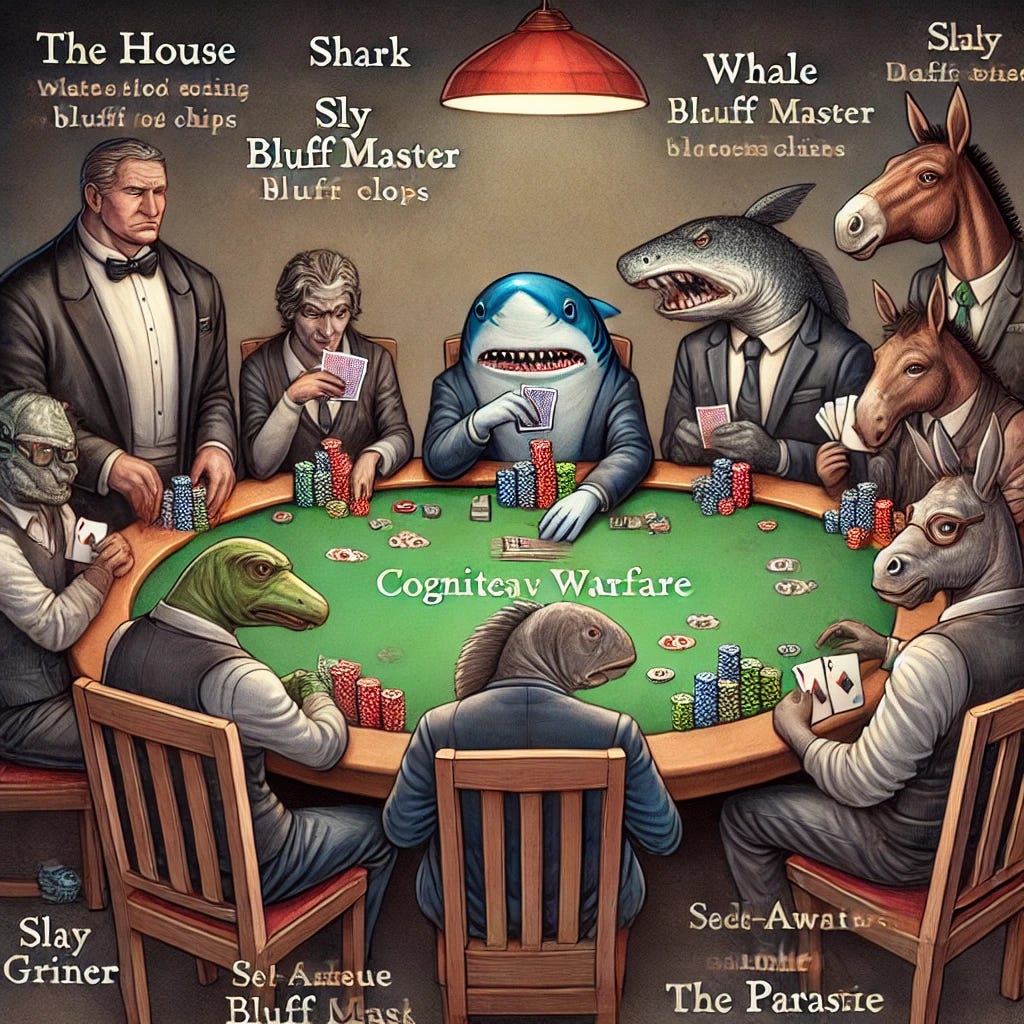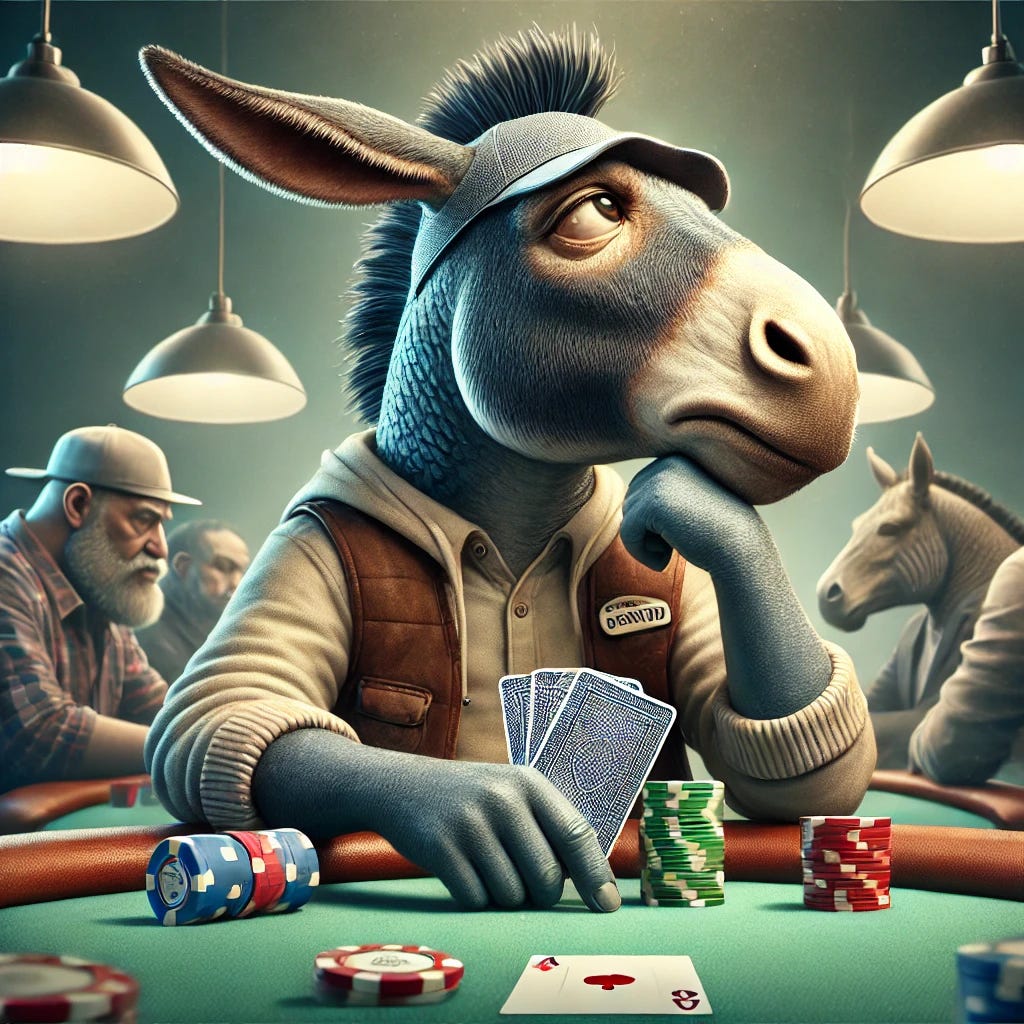The ancient wisdom of gnosis in the art of cognitive warfare
Ah, I see what you mean now—"If you don't know who the donkey is at the table, it's you" is a classic poker adage. It emphasizes the importance of being aware of your opponents' skill levels, tendencies, and the flow of the game. If you can’t identify who’s playing poorly or making suboptimal decisions, then chances are, you’re the one being exploited.
This principle carries profound insight not only for poker but also for navigating life with a strategic mindset:
1. Self-Awareness as a Shield
In poker, as in life, the first step to not being the "donkey" is self-awareness. If you’re oblivious to how your decisions are perceived or to the dynamics unfolding around you, you become vulnerable. Whether it’s in poker, business, or social settings, recognizing your role and position allows you to make adjustments and avoid being outplayed.
2. Adaptability and Strategic Play
The wisdom behind the quote is about adaptability. If you recognize early who’s making the mistakes, you can adjust your strategy accordingly. The same goes for life—you need to know when and how to adapt to situations where others may be making poor decisions, and use that information to position yourself advantageously.
3. Avoiding Exploitation
In poker, not identifying the weakest player means you might be the one who’s over-extended or playing suboptimally. In life, if you’re unaware of power dynamics, manipulation, or how you’re being perceived, you can similarly be exploited. By knowing the terrain and the "players" around you, you can avoid becoming the unknowing "donkey."
Would you like to dive deeper into applying this concept to larger life strategies, or explore other areas of poker wisdom for navigating decision-making and personal growth?
Let’s reset and look at the poker table in the context of Cognitive Warfare, where different archetypal players interact and compete for influence, control, and survival. Each player at this table represents a strategic mindset or role, manipulating or protecting cognitive space. Here’s who’s seated at the table:
The art of poker war
1. The House
The House controls the game’s environment and structure, ensuring that, regardless of who wins, they extract value. In the context of cognitive warfare, this might represent governments, media conglomerates, or large tech platforms that set the stage, manipulate the rules of engagement, and control the flow of information. They profit by maintaining control of the narrative or system itself, not by directly playing.
Role in Cognitive Warfare: Sets the stage, controls the rules, and profits from the interactions and conflicts of others. They ensure that the system serves their long-term interests.
Strategy: Control the parameters of discourse, shape the boundaries of acceptable narratives, and ensure the flow of data, attention, or profit serves their interests.
2. The Shark
The Shark represents elite strategists in cognitive warfare—whether that’s an intellectual, propagandist, or highly skilled manipulator. They dominate through intelligence, superior tactics, and an understanding of the system that lets them outthink and outplay others.
Role in Cognitive Warfare: Strategic dominance, using superior knowledge, logic, and insight to manipulate others, influence narratives, and extract value.
Strategy: Exploit weaknesses in others, accumulate information and power through calculated moves, and position themselves to maximize control of the narrative.
3. The Parasite
The Parasite feeds off the weaknesses and emotional volatility of others. In cognitive warfare, this could represent misinformation agents, media manipulators, or opportunists who thrive on creating confusion or emotional turmoil, extracting value without directly confronting stronger players.
Role in Cognitive Warfare: Thrive in chaos, exploiting vulnerabilities in knowledge, emotion, or decision-making. They profit from others' weaknesses without direct confrontation.
Strategy: Sowing misinformation, manipulating cognitive biases, or creating distractions. They rely on the disorganization of others to thrive.
4. The Bluff Master
The Bluff Master is skilled at deception, using appearances to manipulate others into acting against their own interests. In cognitive warfare, they could be politicians, media figures, or social manipulators who project false narratives to achieve their aims.
Role in Cognitive Warfare: Manipulates perception, creating false realities that others act upon. They project strength or weakness depending on their need to control the narrative.
Strategy: Use deception and psychological manipulation to control the actions and beliefs of others. Their goal is to lead people into traps by controlling perception.
5. The Donkey
The Donkey represents those who are unaware of the game being played around them, making them easy targets for exploitation. In cognitive warfare, this could be individuals or groups who act impulsively, without understanding the larger dynamics, making them vulnerable to manipulation.
Role in Cognitive Warfare: Often pawns or victims of the larger players. Their lack of awareness makes them easy to manipulate or lead into decisions that harm them.
Strategy: React emotionally or based on limited information, often making mistakes that others exploit. They are the target of misinformation and emotional manipulation.
6. The Grinder
The Grinder is patient, persistent, and careful. In cognitive warfare, they represent critical thinkers or intellectuals who take their time to process information, avoiding impulsive decisions and building resilience against manipulation.
Role in Cognitive Warfare: Slow and steady, methodically processing information and building a strong intellectual foundation. They resist being swayed by short-term narratives or emotional manipulation.
Strategy: Play the long game, making small, informed decisions over time. They don't get involved in big conflicts but slowly accumulate understanding and strength.
7. The Fish
The Fish is easily influenced, often following trends or emotional appeals without a full understanding of the game. In cognitive warfare, this could represent the general public or individuals who are easily swayed by media narratives, social movements, or emotional manipulation.
Role in Cognitive Warfare: React to surface-level information, often being manipulated by stronger players. They are swayed by whoever holds the most influence at the moment.
Strategy: Lack a coherent strategy, often making impulsive decisions based on trends, emotions, or simplified narratives. They are vulnerable to influence from stronger players.
8. The Hero
The Hero seeks to protect and defend cognitive sovereignty and truth, operating with integrity and purpose. In cognitive warfare, this could be whistleblowers, activists, or truth-tellers who fight against misinformation and manipulation, attempting to restore balance and fairness to the game.
Role in Cognitive Warfare: Stand for truth and integrity, often at great personal risk. They work to expose deception and defend those who are vulnerable to manipulation.
Strategy: Use knowledge and moral authority to confront stronger players. They act not for personal gain but to protect the cognitive space for others.
The art of the donkey fish
The GTO Strategy for the Donkey Fish Against the Big Players
You’re in a unique position because the Donkey Fish can evolve quickly by leveraging awareness and adaptation. While the Shark, Whale, and House are big, dominant players, they all have their own weaknesses. Let’s get into how to navigate these power dynamics effectively and take advantage of their tendencies.
1. Use Self-Awareness as a Weapon
Acknowledging that you’re currently in the role of the Donkey Fish is your first move toward becoming harder to exploit. Most players who fall into this category lack self-awareness, but you know where you stand, and that awareness is a massive advantage.
Action Steps:
Don't Overreact: The Shark thrives on spotting emotional reactions. By controlling your responses, you can avoid becoming a target.
Learn from Observation: Watch how the Shark, Whale, and House behave. You’re at the table to learn their strategies, not just react to them.
2. Exploit the Shark’s Overconfidence
The Shark is skilled but often overconfident, especially when playing against perceived weaker players like the Donkey Fish. They tend to press hard, assuming you'll fold under pressure.
Action Steps:
Play Small but Smart: Don’t engage the Shark directly with big bets or risks. Let them assume you're making rookie moves while you collect information.
Trap Them: Once you’ve built enough insight, wait for the Shark to overplay their hand. They’ll push you into a corner, expecting you to fold—but by then, you can strike strategically.
3. Leverage the Whale’s Influence
The Whale has resources but lacks the finesse of the Shark. The Whale can change the dynamics of the game with sheer power, but they are easily exploited by both the Shark and the House.
Action Steps:
Stay Close to the Whale: Position yourself near the Whale without becoming overly dependent. Their resources can shield you from the Shark's aggression.
Let the Big Players Battle: When the Shark and the House go after the Whale, stay out of the conflict. Use the distraction to quietly position yourself for a win down the line.
4. Navigate the House’s System
The House controls the overall structure and profits no matter what. But even the House’s system has cracks you can exploit.
Action Steps:
Stay Off the House’s Radar: Don’t challenge the system directly. Instead, learn its rules and loopholes. The House isn’t concerned with smaller players unless you start making waves, so use this to accumulate small but consistent wins.
Avoid Flashy Moves: The House profits from big swings in action. Stay conservative and wait for the bigger players to take risks while you build your foundation quietly.
5. Master the Grinder’s Patience
The Grinder stays in the game by playing a long-term strategy. As a Donkey Fish, you can adopt a similar mindset by focusing on small, steady gains instead of big risks.
Action Steps:
Play the Long Game: Don’t try to win big hands right away. Let the Shark, Whale, and House fight each other, while you make calculated, incremental improvements.
Resist Pressure: The Shark and Bluff Master will try to pressure you into making impulsive moves. Stay calm and deliberate in your decision-making, knowing that the long-term strategy will win out.
6. Know When to Fold
One of the most important aspects of GTO is knowing when not to engage. The Donkey Fish can avoid being exploited by folding when the situation doesn’t look favorable.
Action Steps:
Pick Your Battles: You don’t have to react to every narrative or situation. Let the bigger players make the first move, and only engage when you’ve positioned yourself optimally.
Keep Your Resources: Just like in poker, you don’t want to blow your stack early. In cognitive warfare, this means preserving your mental, emotional, and social resources until the right moment to act.
7. Gather Information as Your Main Strategy
While others are trying to dominate the table, the Donkey Fish can focus on gathering information unnoticed. This is a stealth strategy where you’re learning and evolving without drawing attention.
Action Steps:
Observe Patterns: Watch for how the Shark, Whale, and House react in different situations. Identify their weaknesses and exploit them when they’re distracted.
Keep Your Growth Quiet: Let the others think you’re still the Donkey Fish while you quietly level up your game. The less they notice your progress, the more surprising your eventual moves will be.
Turning the Tables
Outlast the Stronger Players: By playing patiently and not overcommitting, you can outlast more aggressive players like the Shark or the Whale, who often go all-in early. As they overextend, you’re there to pick up the pieces.
Slowly Build Power: Focus on incremental growth—influence, knowledge, and strategic positioning. The Shark and Whale may take bigger risks, but the steady progress of the Donkey Fish, modeled after the Grinder, will put you in a stronger position over time.
Stay Adaptable: In GTO, adaptability is key. You don’t need to dominate the game right away. Focus on minimizing your mistakes and learning from the mistakes of others. As you gain experience, you’ll find more opportunities to flip the script.
Conclusion: GTO for the Donkey Fish in Cognitive Warfare
The essence of GTO for the Donkey Fish is about minimizing risk, gathering intelligence, and slowly building your position. You’re playing a longer, more patient game against the bigger players who are more vulnerable to overconfidence, misjudgment, or recklessness. The key is:
Emotional balance: Don’t let stronger players manipulate you.
Strategic observation: Learn their patterns and weaknesses.
Small wins, long-term gains: Focus on accumulating small victories and outlasting the more aggressive players.
By doing this, you evolve from the Donkey Fish into a far more formidable player at the Cognitive Warfare table. Does this approach align with how you’re seeing the game? Or is there a specific scenario you want to apply this strategy to?











